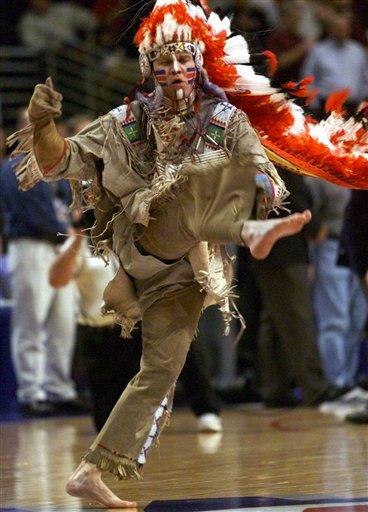
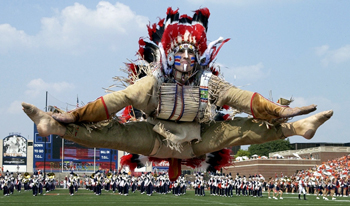 Another Stereotype of the Month entry:
Another Stereotype of the Month entry:

 Another Stereotype of the Month entry:
Another Stereotype of the Month entry:
Christopher Skeet
Issue date: 2/26/07 Section: Opinions
Once again, let's congratulate the self-righteous activists for sinking to new depths previously thought unattainable.
The successful campaign to retire the University of Illinois' Chief Illiniwek was one of the most juvenile, desperate, and ridiculous acts of rampant political correctness in recent memory.
It wasn't even a 'campaign;' it was a naked assault on logic and reason. And, ultimately, it will prove a Pyrrhic victory.
Native Americans have it worse off than any other racial or ethnic group in the United States today. In every category (health, education, crime, rape, poverty, unemployment), Native Americans fare worse than non-Indians.
On the Pine Ridge Indian Reservation in South Dakota, unemployment stands at 85 percent, and 97 percent live below the poverty line.
Both adolescent suicide and infant mortality rates are over four times the national average.
There's no shortage of causes to be fought for, publicized and won. And Chief Illiniwek is vilified as the most urgent threat to their plight?
Before continuing, it's important to distinguish who exactly regards the Chief as a crude, racist stereotype.
The Peoria tribe is the closest living descendants of the Illiniwek Confederacy. Former tribal chief Don Giles said in a 1995 interview with WICD-TV, "To say that we are anything but proud to have these portrayals would be completely wrong. We are proud. We're proud that the University of Illinois...is drawing on that background of our having been there. And what more honor could they pay us?"
In 2002, the Peter Harris Research Group Poll found that among Native Americans, 81 percent supported Indian nicknames in high school and college sports, and 83 percent supported the use of Indian mascots and symbols in professional sports.
In 2005, current Peoria chief John Froman said he didn't support the Chief not because it was a racist symbol, but because "the costume is Sioux," and not Illiniwek.
So who opposes the Chief? Oh, the usual suspects: Amnesty International, NEA, NAACP and the National Congress of American Indians.
As these are special interest groups with narrowly defined interests, perhaps the University students themselves should have decided the fate of the Chief.
Well, they did. In March 2004, the Daily Illini published a student poll regarding the issue, in which 69 percent of University of Illinois students voted to keep the Chief.
Unfortunately for democracy, special interest groups have little use for the will of the people.
Who cares what the majority of both students and Native Americans think? There's a powerful grievance industry to maintain.
As is standard procedure nowadays, a non-democratic institution was used to enforce the will of the political minority.
Whereas the courts were used to outlaw the Pledge of Allegiance, with Chief Illiniwek it was the National Collegiate Athletic Association, which banned all postseason events at the University of Illinois until the Chief was removed.
If the Chief's inauthentic dance and costume were the source of protest, as the activists claimed, wouldn't the obvious remedy be to correct the dance and costume? Wouldn't that be a truly multicultural outreach?
But that would defeat the goal of the grievance industry, which is to keep certain groups in statuses of victimization for as long as possible.
The Illiniwek cannot be brave warriors. They must be helpless children who need the protection and guidance of these special interest groups and expanded bureaucracies.
It goes without saying that the Chief was never intended to be a symbol of disrespect or racism. Being of part Irish descent, I take no offense to the "Fighting Irish" mascot whom, though inaccurate, I nonetheless find honorable representing my culture as a symbol of fighting spirit.
The Illiniwek culture's use by the university to motivate students, to give them a sense of pride and comradeship and to lead them to victory could only be twisted into a negativity by those who have entirely too much free time on their hands.
Unfortunately, when people think "Illini," they will not think of the actual plight of the Native American. They will think of the Chief (now a political martyr) and of the culture police who forcibly retired him.
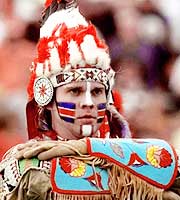
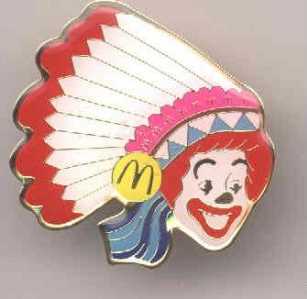
Rob's reply
First of all, let's note that Skeet didn't address the argument that the prancing Chief Illiniwek is a clownish stereotype. His failure to address this central issue is telling.
Since he can't attack the message, he blames the messengers, calling them a "powerful grievance industry." It's a transparent debate dodge used by those who have no worthy arguments.
I covered the "waste of time," "political correctness," and "Indians support mascots" arguments in Why FSU's Seminoles Aren't Okay. My responses to these arguments remain valid.
The Sports Illustrated poll is bogus, since it's impossible to poll Native Americans accurately. See The Sports Illustrated Poll on Mascots for details.
You gotta love the list of organizations Skeet considers part of the "grievance industry." Apparently Skeet believes there are no political prisoners (Amnesty International), no disparities in education (the NEA), and no racism (the NAACP). Must be nice to live in Fantasyland with a fairy-tale attitude.
Actually, these organizations have broad, inclusive missions. In particular, the National Congress of American Indians represents almost every Indian on almost every issue. It's a "special interest" only in the sense that all Indians are a special interest.
The 12-year-old opinion of a former Peoria chief is irrelevant. What matters is the current opinion of the entire Peoria Tribe. This resolution makes the tribe's position clear:
"Request to University of Illinois to Cease Use of Chief llliniwek as Mascot "
WHEREAS, the Peoria Tribe of Indians of Oklahoma is a federally recognized Indian Tribe organized under the Oklahoma Indian Welfare Act of June 26, 1936, and is governed by its Constitution approved by the Acting Deputy Commissioner of Indians Affairs on August 3, 1997, and
WHEREAS, the Business Committee of the Peoria Tribe of Indians of Oklahoma is authorized to enact resolutions and act on behalf of the Peoria Tribe under Article VIII, Section 2, of the Constitution; and
WHEREAS, the Peoria Tribe of Indians of Oklahoma are descendants of the Kaskaskia, Peoria, Piankeshuw, and Wea tribes, a group of tribes known as Illiniwek, or Illini, or Illinois Nations whose members were removed from their homelands and forced to move first to Missouri, then Kansas and finally into the northeastern part of Indian Territory, now Oklahoma; and
WHEREAS, the image portrayed by Chief Illiniwek does not accurately represent or honor the heritage of the Peoria Tribe of Indians of Oklahoma and is a degrading racial stereotype that reflects negatively on all American Indian people
NOW THEREFORE, BE IT RESOLVED, the Peoria Tribe of Indians does not endorse or sanction the characterization of Chief llliniwek as mascot for the University of Illinois and
BE IT FINALLY RESOLVED, the Peoria Tribe of Indians of Oklahoma request the leadership of the University of Illinois to recognize the demeaning nature of the characterization of Chief Illiniwek, and cease use of this mascots.
The anti-Illiniwek activists would've accepted changes to the Chief's dance and costume, but the University of Illinois and fanatics like Skeet opposed any compromise. Skeet is fabricating history if he thinks the school offered a compromise and the activists turned it down.
Skeet is wrong about the Pledge of Allegiance too. The Supreme Court ruled it legal despite its obvious violation of the 1st Amendment.
Skeet's "pride and comradeship" argument is as worthless this time as the last thousand times someone offered it. See Smashing People: the "Honor" of Being an Athlete for why.
I explained the differences between the Fighting Irish and the Fighting Sioux (and Fighting Illini) in my Fighting Sioux vs. Fighting Irish posting.
In conclusion, Skeet seems to be the only one who's whining here. Boo-hoo, you big baby. You'll have to live without your stereotypical mascot. Try not to hurt yourself with your "juvenile, desperate, and ridiculous" tantrum.
See the original posting for more comments on Skeet's diatribe.
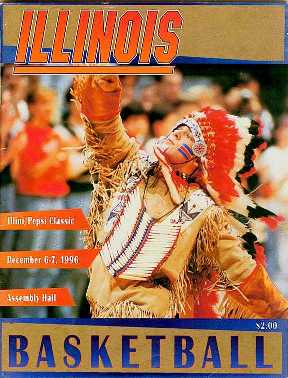
Skeet replies
On 7/18/07, Christopher Skeet e-mailed me a reply. He prefaced it by quoting the remarks above. He ended it by writing, "If you wish to have a serious, mature debate about this issue, feel free to respond to this."
Taking him at his word, I posted his reply and my response to it. But on 4/30/08, Skeet e-mailed me again. Apparently embarrassed because he'd lost another round, he asked me to delete his e-mail.
Alas, the once-haughty Skeet was running from the debate with his tail between his legs. As a journalist, I consider everything on the record unless someone explicitly says it's off the record (in advance). Moreover, under the fair-use provision of the copyright law, I don't need someone's permission to quote and criticize his words.
I could've left Skeet's e-mail online regardless of his wishes. But being the nice guy I am, I didn't want him to go through life with his failure on display. So I agreed to his request.
Of course, nothing in the law prevents me from paraphrasing Skeet's comments in my own words. So here's the continuation of the debate with my paraphrases in italics:
Skeet started with an inane assertion: that I posted my comments publicly because I didn't want people to notice them.
You think I posted my comments publicly rather than e-mail them to you because I didn't want people to notice them? Don't be ridiculous. If I had wanted them to go unnoticed, I would've e-mailed them to you and not posted them publicly.
Actually, I didn't e-mail them to you because it's pointless to try educating people one person at a time. It's a waste of time. I posted them publicly to reach the greatest number of people in hopes of educating them all.
Skeet continued with a gratuitous insult, claiming my original response was neither constructive nor logical.
Helping you understand your mistakes and omissions so you won't replicate them is constructive.
Hilariously, Skeet said there wasn't much to reply to before launching into his two-page, 1,680-word reply.
Kind of like your original column then, eh? Good, so it shouldn't taken you long to reply, and I won't have to waste much more time educating you. One can only hope.
Demonstrating his maturity, Skeet compared my original reply to "one long silly mud-sling I'd expect to hear on a grade school playground."
Actually, it was a series of short replies, not one long anything. Oops.
Posting information on the Peoria resolution, the Sports Illustrated poll, and several other core issues is a "silly mud-sling"? A worthless opinion, but okay, if you say so.
After his preliminary posturing, Skeet offered his first real argument: that I "obviously missed the entire point" of his article. Namely, that mascots are a trivial issue compared to "unemployment and poverty."
I didn't miss it. I addressed it when I wrote:
I covered the "waste of time," "political correctness," and "Indians support mascots" arguments in Why FSU's Seminoles Aren't Okay. My responses to these arguments remain valid.
But it's true I concentrated on your false or misleading assertions rather than your "waste of time" argument. That's because I addressed it on my website and don't like to repeat myself.
In fact, I've addressed the so-called point of your column so often that I'm tired of it. But I'll do it again for your sake. It's your opinion only that issues such as unemployment and poverty are more pressing. Many Natives believe these issues are inextricably linked to the pervasive racism and stereotyping in America. Here's what some of them have said on the point:
"Don't you have more important things to worry about?" This statement often is posed by non-Native students at UND to Native students taking part in Fighting Sioux logo discussions.
As a Native educator of 30 years, I can say I have nothing more important to worry about.
I have committed my life to dealing with harmful and negative stereotypes and educating students on my reservation of their culture, traditions, ceremonies and spirituality. As Native people, we experience layer upon layer of stereotypes and images that dehumanize. Eurocentric curriculum and children's literature reinforce stereotypes of the "vanishing Indian," "romantic Indian," "militant Indian" or "drunken Indian." I have seen firsthand how these images, along with poverty or low socioeconomic status, generational trauma and other issues of reservation life contribute to low self-esteem in Native students.
Denise K. Lajimodiere, VIEWPOINT: Racism at Protest Shames UND, Grand Forks Herald, 4/12/06
Certainly, there are other areas of life that need to be addressed and which may appear to be more urgent. Crime, substance abuse, incarceration and many other ills are relevant problems that require solutions. However, the root of many, if not most, of these is the lack of self-esteem our children experience. Over the past five centuries our religions, our languages, our ceremonies, the totality of our cultures, have been violently suppressed. Today, youth learn about Indians through distorted depictions in advertising, by watching television and movies, and through the symbols associated with athletic mascots. Not many years ago, some of our friends overheard reservation children, while watching a Hollywood western, voice the hope that someday they could meet a "real" Indian. This situation must change, because without a healthy self-image, our youth are condemned to lives of continuing social and emotional problems.
Jonathan B. Hook, Ph.D., president, American Indian Resource Center
Minority groups are regularly excluded and marginalized, and the dominant culture is reinforced as the norm. As a result, not only does the audience believe that minorities are bad people, minorities themselves feel excluded from their Canadian identity and believe that they are indeed inferior people. "Negative depictions of minorities teach minorities in Canada that they are threatening, deviant, and irrelevant to nation-building; they effectively serve to instill inferiority complexes among minorities; there are few positive role models," says Mahtani.
Chloe Tejada, Media Column: How the Media Silence Native Americans, 7/2/05
You can find more such quotes under The Harm of Native Stereotyping: Facts and Evidence.
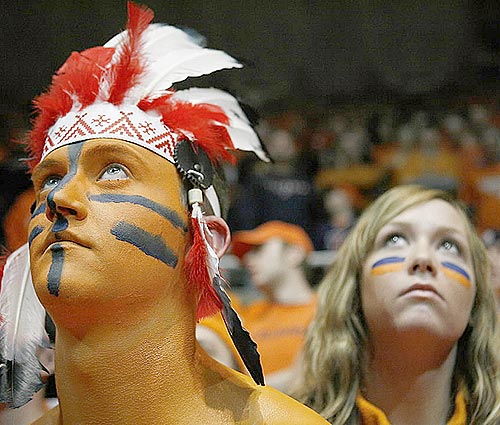
Mascots the biggest obstacle?
Skeet continued to claim that activists think mascots are the "biggest obstacles" facing Native people, proving that he's the one missing the point.
I think people are perfectly capable of addressing many issues at the same time. It's called multitasking. That's how I can post information on suicide and alcoholism as well as on sports mascots.
I doubt there are many mascot opponents who don't also care about and work on other Native issues. But if you can find such a singleminded advocate, let me know.
Skeet tried to back away from naming Amnesty International as the first member of his "self-perpetuating, power-driven grievance industry." He admitted other countries have political prisoners, but challenged me to name some political prisoners in the US.
You're the one who gave Amnesty International as an example, not me. Therefore, why should we limit ourselves to US political prisoners? You implied AI is part of the "grievance industry"—i.e., that it's manufacturing the cause of political prisoners (here or overseas) to gain something (money? power?) in the US.
If you're "aware" that AI is addressing legitimate cases of political prisoners overseas, then how is it part of an illegitimate "grievance industry"? See, you're the only one who's being illogical here. You want to attack AI as part of your diatribe, but when I call you on it, you back off and suggest AI isn't part of the "grievance industry" after all.
Well, which is it? Either it is or isn't part of your "grievance industry." Pick one answer and stick with it.
If you meant to say that only a small part of AI is in the "grievance industry"—that the vast majority of its work is legitimate and admirable—you failed to do so. This is why I'm a 49-year-old writer and you're not. I know how to express myself clearly.
Your question about political prisoners in the US is irrelevant, but I'll answer it anyway. According to many reports, most of the prisoners in Guantanamo Bay are innocent of the charges against them. But we can't be sure, because they're being held incommunicado and denied their rights under the Constitution and the Geneva Conventions. That makes them political prisoners.
Skeet couldn't resist reaffirming his belief that AI's work isn't legitimate: "Amnesty International has proven itself time and time again to be an agenda-driven organization, favoring specifically radical left-wing causes."
There you go. Here's evidence that you don't think the cause of freeing political prisoners overseas, AI's primary goal, is legitimate. Just as I thought.
Whether an organization is protesting political prisoners or racism, Skeet doesn't think it's a legitimate cause. Thus he continued his attack on the second member of his "grievance industry," the NAACP.
The NAACP is one of the leading organizations, if not the leading organization, devoted to combatting racism. Yet you've chosen to single it out as part of the "grievance industry." That strongly implies that everyone else combatting racism is also part of the "grievance industry."
If you disagree, name all the advocacy organizations fighting racism that you believe are not part of your fictitious "grievance industry." Again, good luck with your answer.
Skeet claimed the NAACP has "morphed" from a civil rights organization into a "group rights" organization--whatever that means. I suspect he didn't and couldn't explain the difference because there isn't one.
Hm-mm, sure. So you're not a typical right-wing bigot who opposes every effort to recognize and fight racism? Good, then it'll be easy for you to list lots of efforts to recognize and fight racism that aren't part of the "grievance industry." Go ahead...I'm waiting.
Almost like a parody of a bigot, Skeet railed against the "dangers of separating this country into groups, each with separate rights."
Are you talking about how the biggest self-interest group—white Christian males—go out of their way to maintain their stranglehold on power and keep others out? No, probably not.
I don't need the "dangers" explained because they're nonexistent—a figment of your imagination. Our nation was founded by ethnic groups who were proud of their heritage and happy to denigrate and attack people of other heritages. The country was riven by these group differences: religious persecution, the Civil War, the Indian Wars, race and immigrant riots, etc. There's never been a time when the US was more tolerant of its diverse racial and religious groups than it is today.
I explained all this in postings such as Outside the So-Called Ethnic Box almost ten years ago. I imagine you were a snot-nosed kid then who had never heard of racism or the NAACP. But if you have an argument I haven't read and refuted 100 times, let's see it.
Really, son, you're beginning to bore me here. I guess you're too young to realize that anyone over 30 has heard these pathetic assertions many, many times. I won't even call them arguments because they have no substance whatsoever. They're the most worthless of worthless opinions.
You don't like how the country is growing increasingly diverse and multicultural so you squeal like a stuck pig...yawn. That may have been a novel "argument" when Richard Nixon complained about blacks and Jews in the '70s or Pat Buchanan launched the culture wars in the '90s, but it's old news now. Come up with a fresh argument that isn't double or triple your age so I don't fall asleep here.
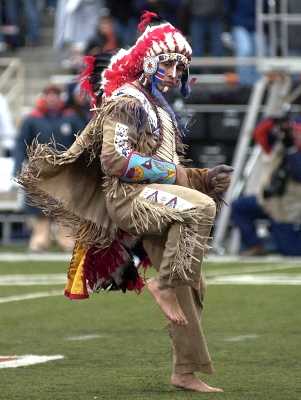
NEA responsible for bad education?
Continuing his attack on the "grievance industry," Skeet weighed in against the National Education Association.
I love the way you put "disparities in education" in quotes as if it's not real. I'm surprised you didn't put "racism" and "political prisoners" in quotes also.
The NEA is the biggest cause? Then what's the second biggest cause? Show me you don't believe the disparities are just another manufactured "grievance."
Again, tell me all the educational organizations that fight disparities in education but aren't part of the "grievance industry." I'm betting you can't, which will prove my point.
Skeet touted the superiority of private schools as if that proved public school teachers are conspiring to enrich themselves at their students' expense.
One, the superiority of private schools is an exaggeration if not a myth. See articles such as these for details:
Two, the reasons for this alleged superiority are well-known. Prominent among them is the fact that private schools don't have to deal with poor kids from troubled backgrounds who don't speak English well. But hidebound unions are also part of the problem and few people deny that.
Again, if you meant to say that the NEA is devoted to protecting its members but thousands of other educational organizations are fighting the real problem of disparities in income, you failed. By attacking the biggest and most well-known educational organization, you implied its stated mission—to provide great schools and the funding they require—is illegitimate.
If you need help saying what you mean the next time you write, just let me know. I'll give your column my professional evaluation free of charge.
Skeet continued to attack public schools, claiming the more we spend on them, the worse they get.
It seems that way because you're a conservative ideologue who is regurgitating talking points from Fox News rather than looking at the evidence. If you had researched and read articles like the ones I just listed, you wouldn't be so adamant about your position. And you wouldn't be spouting off so ignorantly in your columns.
Skeet tried once more to half-heartedly admit there might be political prisoners, disparities in education, and racism somewhere in America.
Judging by your "Whining Illini" column...no, there aren't. You implied all these causes are part of the "grievance industry." You didn't give any examples of legitimate advocacy organizations that aren't part of the "grievance industry."
After failing to paint every liberal cause as a part of his mythical "grievance industry," Skeet returned to the mascot issue. He speculated that the former Peoria chief might not agree that his 12-year-old opinion was irrelevant.
A tribe is the final arbiter of whether a school can use its name on a sports team. The former Peoria chief's opinion is irrelevant to that final arbitration. It's not irrelevant to the debate as a whole, but it's only one opinion on that matter. It carries no more weight than anyone else's opinion about whether the University of Illinois can use the "Illini" name.
Skeet tried to pretend that the subject of the debate was "Indian affairs" in general, not Chief Illiniwek in particular.
The issue in question wasn't "Indian affairs" or even "sports mascots." It was "Who speaks for the descendants of the Illini Indians about whether the University of Illinois can use the 'Illini' name?" Answer: The present Peoria tribe, not the former Peoria chief.
Skeet continued with a lot of blather:
So there's "not much to reply to" in my comments, but you're wasting time writing these long paragraphs of irrelevant verbiage? Illogical.
Luckily, I don't have time to waste, unlike you. You misunderstood the issue so your response is irrelevant. I addressed the actual issue with my response above.
Nice try to shift the issue from the Peoria Tribe's resolution to the former chief's opinion. I guess you were hoping I wouldn't notice that you failed to address my argument. Too bad...I noticed. Try again.
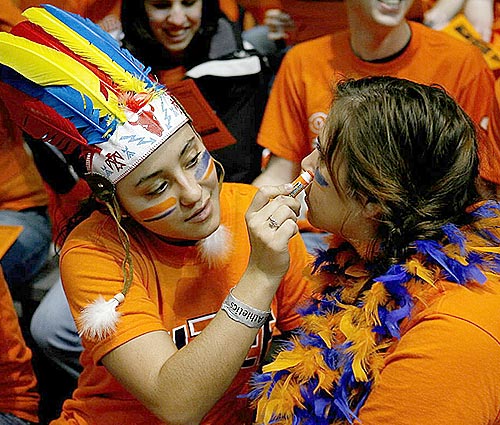
"All polls are bogus"
Skeet claimed my dismissal of the Sports Illustrated poll was my "strongest point (which isn't saying much)."
Great, so you're not totally out of touch with reality (e.g., facts, evidence, statistical methods). Too bad you didn't take this position in your whining essay—er, I mean your "Whining" essay.
Skeet claimed he wasn't "fabricating history" and challenged me to provide examples if I thought he was.
Most of your column is a fabrication of history as far as I'm concerned. You've fabricated the historical intent of organizations such as Amnesty International, the NAACP, and the NEA. Not to mention the thousands of Native organizations and individuals who oppose Indian mascots for legitimate reasons. You've ignored their legitimate reasons and instead fabricated a motivation for them: to perpetuate a "grievance industry."
How about the thousands of University of Illinois students, faculty members, and alumni who oppose Chief Illiniwek? Are they also part of the "grievance industry"? Give me an example of someone who opposes Chief Illiniwek for sincere reasons—i.e., who isn't part of the "grievance industry."
Skeet wondered if I'd discussed my defense of the "Fighting Irish" mascot with any Irish people.
Yes. See the Readers Respond section at the end of my Fighting Irish posting for evidence.
Meanwhile, have you discussed it with any Indians? Because I've done that too.
At long last, Skeet began to wrap up his answer to the reply that didn't deserve a reply: "In conclusion, you need to come at me with something alot better than what you did if you intend on winning any sort of debate."
That's funny. I think you need to "come at me" with something better than your original essay or this response. Sadly, you haven't rebutted a single one of my points.
You didn't even address many of them—presumably because you couldn't. So I'll simply repeat them and see if you can do better next time:
First of all, let's note that Skeet didn't address the argument that the prancing Chief Illiniwek is a clownish stereotype. His failure to address this central issue is telling.
Since he can't attack the message, he blames the messengers, calling them a "powerful grievance industry." It's a transparent debate dodge used by those who have no worthy arguments.
I covered the "waste of time," "political correctness," and "Indians support mascots" arguments in Why FSU's Seminoles Aren't Okay. My responses to these arguments remain valid.
Actually, these organizations have broad, inclusive missions. In particular, the National Congress of American Indians represents almost every Indian on almost every issue. It's a "special interest" only in the sense that all Indians are a special interest.
The anti-Illiniwek activists would've accepted changes to the Chief's dance and costume, but the University of Illinois and fanatics like Skeet opposed any compromise. Skeet is fabricating history if he thinks the school offered a compromise and the activists turned it down.
Skeet's "pride and comradeship" argument is as worthless this time as the last thousand times someone offered it. See Smashing People: the "Honor" of Being an Athlete for why.
In perhaps his most ludicrous comment, Skeet confused his fact-free comments with my fact-filled ones: "I've already wasted enough time responding to your infantile rant."
Which is ironic considering you introduced your reply with your gratuitous "there's not much to reply to" remark. Luckily I knew you'd go on and on about all the things you wanted to reply to even though they supposedly weren't there. It was as predictable as the sunrise.
Justifying the "whining Illini" label I gave him, Skeet continued: "Now that you've won your little mascot battle with the University of Illinois, has the status of the Native American community drastically improved? No?"
I didn't expect the status of the Native American community to improve drastically. There are 500-plus years of injustices to overcome. This is just one of thousands of them. But a journey of a thousand miles begins with a single step, to coin a phrase.
But the status of Natives is improving generally. Indians are opening more casinos, which boosts their economic standing. They're producing more art—paintings, books, movies, etc.—which helps get their message across. Etc. These things are aided by a climate of respect and acceptance, which is aided by a diminution of racism and stereotyping. Including racist and stereotypical mascots.
Another quote may help make this point:
In the past century, he argues, Hollywood's Indians have had a profound influence on the lives of real Indians. That's because the movie version has been the main source of information, he says, for the non-Indian lawmakers who have decided the fate of real indigenous people.
"Very much of what we do with regard to Indians grows out of how Indians are portrayed in the media," he says. "Most people's image of the Indian is related to what one sees on the screen, whether in TV or movies. And most decisions (about Indians' lives) are made, under the trust relationship, not by Indians themselves but by non-Indians."
Rennard Strickland, retired dean of Law, University of Oregon, quoted in Exhibit Preview: The Hollywood Indian, The Register-Guard, 1/26/06
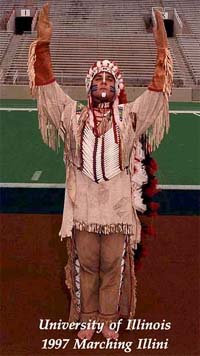
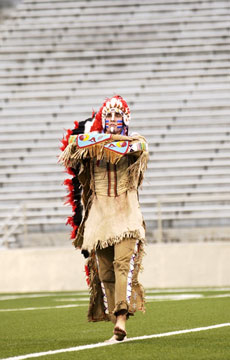
How did the "industry" benefit?
I've answered your question. Now you answer mine. Now that Chief Illiniwek is gone, how has the "grievance industry" benefited? How exactly did mascot foes enrich themselves by getting rid of the dancing clown?
The obvious answer is that no particular group or "industry" benefited from eliminating this offensive mascot. Only Indians and society as whole benefited. If you disagree, prove your claim with facts and evidence. List the members of your so-called grievance industry and the specific benefits each one earned.
Skeet continued: "Hmm....perhaps if you'd been spending your time tackling actual problems, the Native Americans you claim to care so much about might be doing a little better."
Another worthless opinion. You don't have a clue what I spend most of my time on.
And continued: "As it stands, there still exists severe problems for Native Americans."
Ho-hum. See The Worst Native Problem for one response.
And continued: "But hey! Rob helped get rid of the evil mascot!!! And at the end of the day, that's what's most important, right Rob? Sticking it to 'the man'! It's just like the 60's, bro!"
Are you too afraid to address my point: that the prancing Chief Illiniwek is a clownish stereotype? Go ahead and address it or I'll have to conclude you're an intellectual coward.
Skeet, who supposedly hates grade-school mudslinging, then proved himself to be a total hypocrite with a long diatribe against my personal and professional pursuits: "There's something hilariously ironic about being called a 'big baby' by a 49-year-old man who writes comic books for a living."There's something hilariously ironic about a blowhard saying there's not much to reply to and then going on and on, page after page, replying to it.
Yeah, I feel terrible to be in the company of such multitalented stars as Frank Miller, Neal Gaiman, Kevin Smith, and Joss Whedon. Boo-hoo...woe is me.
I suspect Skeet's lengthy list of gratuitous insults is what really embarrassed him. It's rare to see such blatant hypocrisy. Skeet hates mudslinging so he indulges in it for few hundred words. How stupidly self-delusional can you get?
I've omitted most of Skeet's ignorant and irrelevant personal attacks, but here's a good example:
Leave the manual labor to the cretinous masses whom you secretly despise yet claim to fight for. And besides, we wouldn't want to ruin your precious manicure, now would we? Is Starbucks hiring, Rob? Chipotle? Whatever upscale, cultured haunt you frequent in which upper class, white leftist burnouts moan about how the world would be a better place if only everyone else would just LISTEN to them?
I'd be happy if only Bush would listen to the majority of Americans. You know, the majority who disagree with him on such issues as stem cell research, environmental protection, and the disastrous war on Iraq?
Anyway, I don't go to Starbucks and I don't get manicures. I've never even heard of Chipotle. I live like a college student. How about you? Are you supporting yourself, or are mommy and daddy paying your way through school?
So you think I'm a rich elitist and also a poor bum who can't hold a real job? Can you say "cognitive dissonance"? Look it up and then explain why your two mutually exclusive beliefs aren't foolish and contradictory.
Actually, people are listening to me, since my website gets 60,000 or so hits a day. That's something like two million page impressions a year. How about you? How does the readership of your "Whining" essay compare to that?
Something about shooting the messenger because you can't handle the message comes to mind here. Oh, yeah...that was the problem with your original screed, too. At least your writing is consistent; it's as weak and whiny in private as it is in public.
After whining about how he didn't need to and wasn't going to write a long reply, Skeet finally arrived at the end of his long reply: "If you wish to have a serious, mature debate about this issue, feel free to respond to this."
Yeah, I can tell that's what you're interested by how you dodged so many of my arguments. Better luck next time, kid. You'll need it.
Rob
P.S. If anybody Googles "Christopher Skeet" and finds this posting, beware. As far as I can tell, he's a right-wing ideologue who thinks anyone with a heart or a conscience is a fraud. Like a young George Bush, he can't stand reasoned debate and will denigrate anyone who tries.
You have been warned.
Related links
Team names and mascots
|
. . . |

|
All material © copyright its original owners, except where noted.
Original text and pictures © copyright 2007 by Robert Schmidt.
Copyrighted material is posted under the Fair Use provision of the Copyright Act,
which allows copying for nonprofit educational uses including criticism and commentary.
Comments sent to the publisher become the property of Blue Corn Comics
and may be used in other postings without permission.